At one point or another, everyone has to apply for a job without having prior experience. Whether you’re searching for your first job or moving into a new field, you may wonder how to make a resume with no experience.
Luckily, there’s plenty of other information you can include on your resume.
Don’t let your lack of experience hold you back. Learn how to write a stellar resume for your first job with this helpful guide and sample resumes with no experience. You can also try an ai resume generator to create a tailored resume quickly.
Resume templates and examples for no experience
College Student
Internship
Teen
High School Student
Food Server
How to choose the right format for a resume with no experience
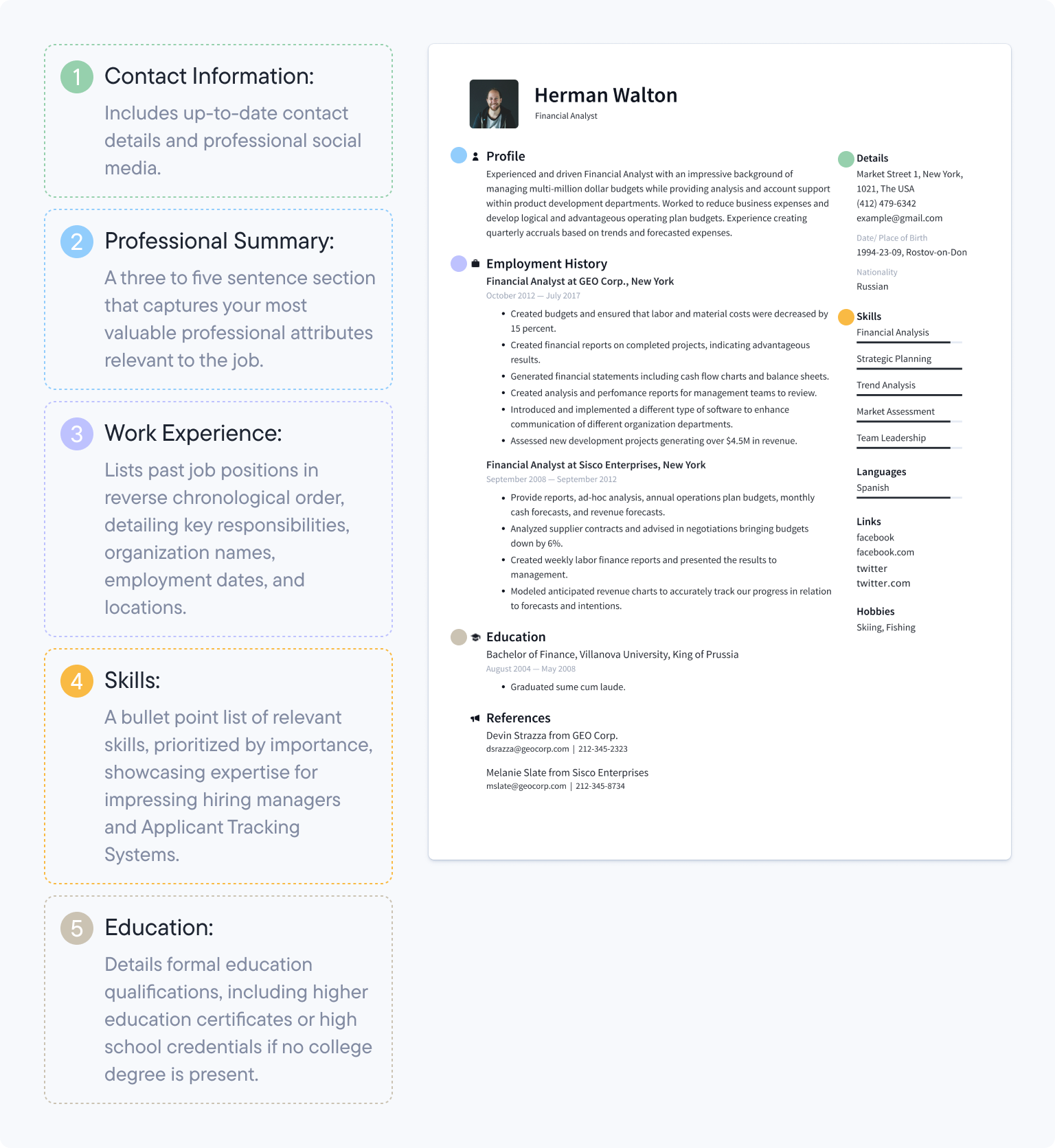
When formatting your resume, you have three options:
- Reverse-chronological (most common). This format works best if you have some non-work experiences to include on your resume. These can include internships, academic projects, coursework, or volunteer commitments. List those experiences in reverse chronological order, beginning with the most recent.
- Functional. Use this format if you want to highlight your skills. List your education at the top of your resume, followed by your skills. You can group your skills into categories, such as “communication skills” and “computer skills.”
- Hybrid. A hybrid resume combines elements of the other two formats. It can work well if you want to focus on your education and skills while including one or two non-work experiences.
How to write a resume with no experience
To write a resume with no work experience, you need to tell the story of your potential. Before you begin, take some time to consider the skills, attributes, and life experiences you can bring to a new job.
A resume for a first job should look like any other resume—just with less emphasis on work experience. Use a professional format and structure to build your resume. Here’s a step-by-step guide for how to write a resume with no work experience:
- Make a resume header
- Create a professional summary or objective
- List your education
- Include internships, volunteer work, or other experience
- Add a skills section
- Consider optional sections
1. Make a resume header
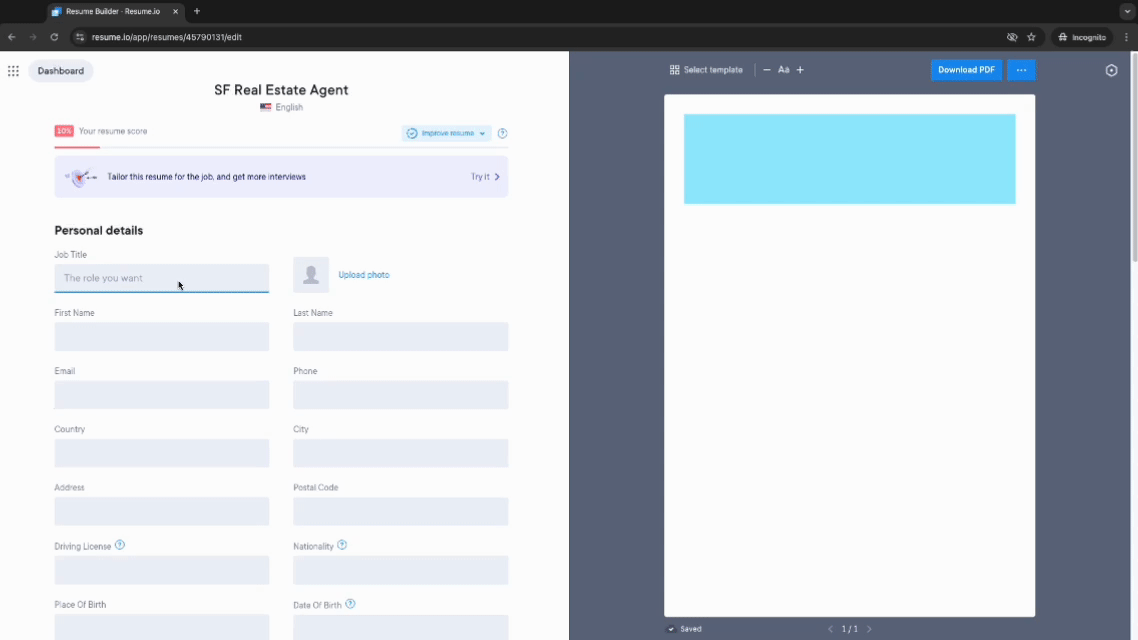
Your name and contact information should feature prominently at the top of your resume. Make these details easily accessible so a hiring manager knows how to contact you for an interview.
In your resume header, include these elements:
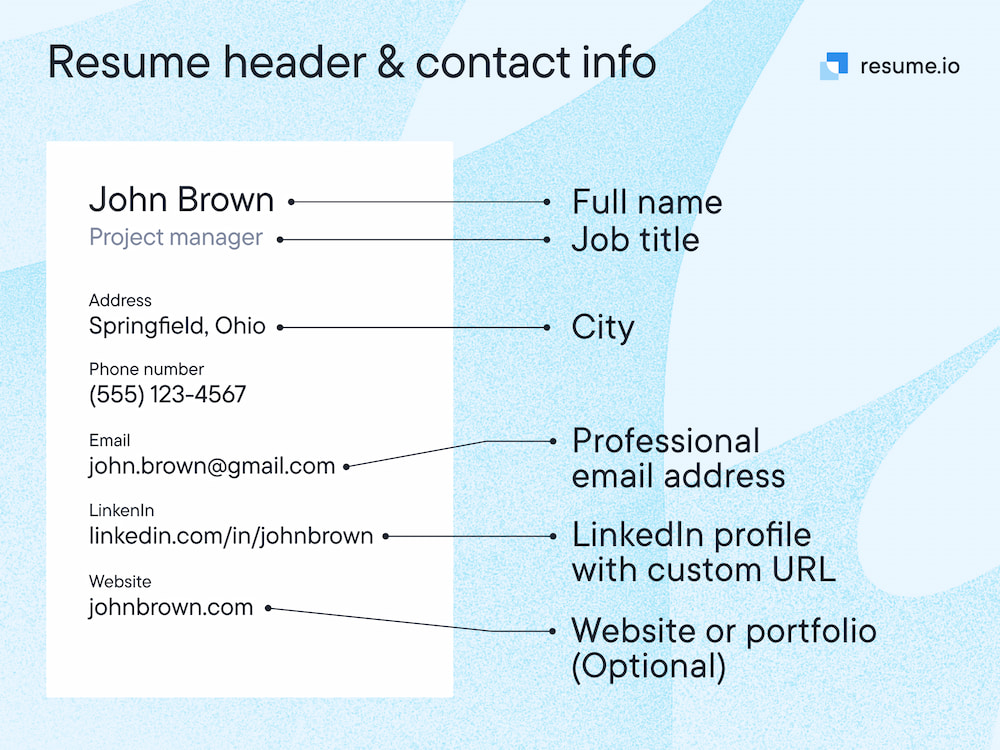
- Your full name. Provide your first and last name.
- A professional email address. Use an email with a combination of your name or initials to appear professional.
- Your phone number. Give hiring managers the best number to reach you.
- Your city and state. Include the city and state where you live.
- A link to your LinkedIn profile (optional). If you have a LinkedIn profile, you can link to it in your header.
- Add “ willing to relocate” to your header if you’re looking for jobs in another region.
- Double-check your contact information. Even one missed digit in your phone number can prevent a hiring manager from contacting you.
- Provide your full address, school name, or dorm building as part of your address. Giving this information can create safety concerns.
- Add other personal details, like your date of birth or photo.
2. Create a professional summary or objective

A professional summary or objective is a short statement summarizing your strengths and abilities relevant to the position. It aims to answer the question, “Why should a prospective employer hire me?”
If you have no work experience, you might wonder what you have to summarize. For your first resume, focus instead on your personal qualities, such as a strong work ethic or meticulous organizational skills. You can also mention your career objectives, including what you hope to gain from working in the role. Your goal is to craft 2 to 3 sentences that summarize your value as a potential employee.
Check out these summaries on a sample resume with no work experience:
Objective statement for a high schooler with no experience
Enthusiastic and hard-working student with a strong interest in building foundational skills and collaborating in a team environment. Known for reliability, excellent communication skills, and an eagerness to learn.
Resume summary for a college student with volunteer experience
Dedicated college student majoring in psychology with volunteer experience in community outreach. Proven record of communicating effectively and solving problems through volunteer work with local shelters and tutoring programs.
Resume summary for a recent graduate with internship experience
Driven marketing graduate with internship experience in social media management and content creation. Developed analytical and project management skills while collaborating with a marketing team to support campaign goals. Ready to apply digital marketing knowledge in a full-time role to drive audience engagement and organic growth.
3. List your education
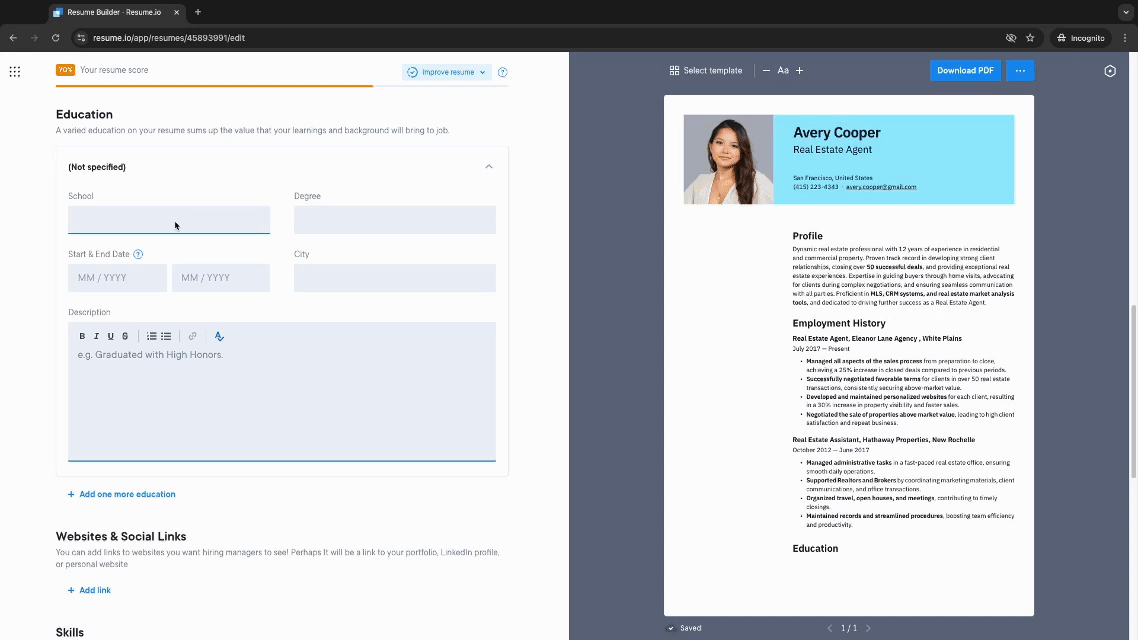
For your first resume with no professional experience, list your education toward the top of the document. Most likely, your education will be the best way to show an employer your capacity for learning and development—essential qualities for the early years of your career.
Your education section can include some additional details that experienced professionals typically don’t have on their resumes. This information can help you build out your resume so it appears more comprehensive.
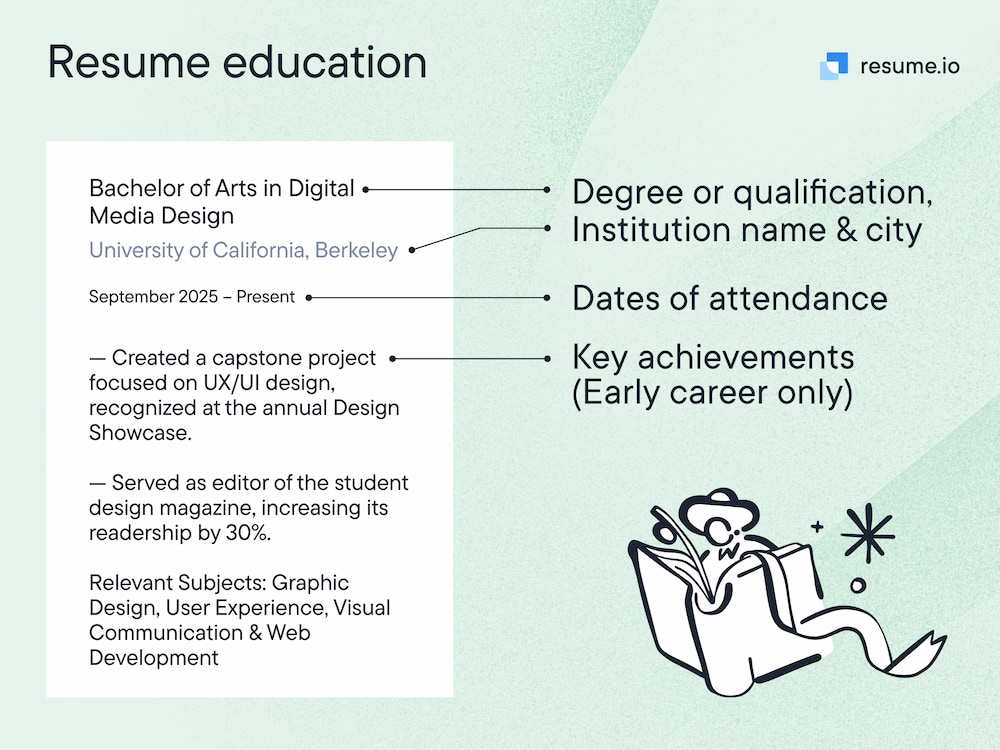
Here are some elements you can put in your education section:
- Name of your diploma or degree. Provide the full name of your diploma or degree, such as “ high school diploma” or “associate degree in healthcare administration.” If you’re working toward a degree, include your expected graduation date.
- Name of the institution. Include the full name of your high school, trade or vocational school, or college.
- GPA. If you have at least a 3.5 GPA, you can add it to your resume. A high GPA is an impressive accomplishment to many employers.
- Academic honors or achievements. You can include academic honors you’ve received, such as graduating summa cum laude or being named to the dean’s list.
- Relevant coursework. If you’ve taken classes that are relevant to the job you’re applying for, list them in your education section.
- School activities or extracurriculars. Participating in school activities can show an employer your ability to handle multiple responsibilities and work well with others. For example, you may include your participation on a sports team or your involvement in student government.
You can view a copyable example of an education section for a college student below:
Resume education section for a college student
Bachelor of Science in Marketing
University of California, Berkeley
Expected graduation May 2025
3.7 GPA
Dean’s List, Fall 2023 and Spring 2024
Relevant coursework:
- Digital marketing strategies
- Consumer behavior
- Marketing analytics for business
4. Include internships, volunteer work, or other experience

If you’re like most first-time job seekers, you might be worried about what to put in the “experience” part of your resume. Fortunately, however, there are many options for filling out this section, even if you’ve never worked in a professional environment before.
Use your experience section to discuss other relevant work you’ve done, whether you’ve gotten paid for it or not. Here are some experiences you can include on your resume:
- Volunteer work. List your volunteer experience to show how you’ve contributed to an organization. Think about behaviors you’ve used as a volunteer that may be useful in your first job. Additionally, share functional hard skills you’ve gained from volunteering.
- Internships. An internship can be a great way to prove you understand how to follow directions and work with team members. Include all your internship experience on your resume, even if you were unpaid.
- Extracurricular activities. If you’ve participated in extracurricular activities outside of school, mention them in your experience section. Sports, music, drama, and other activities can showcase your commitment and dedication.
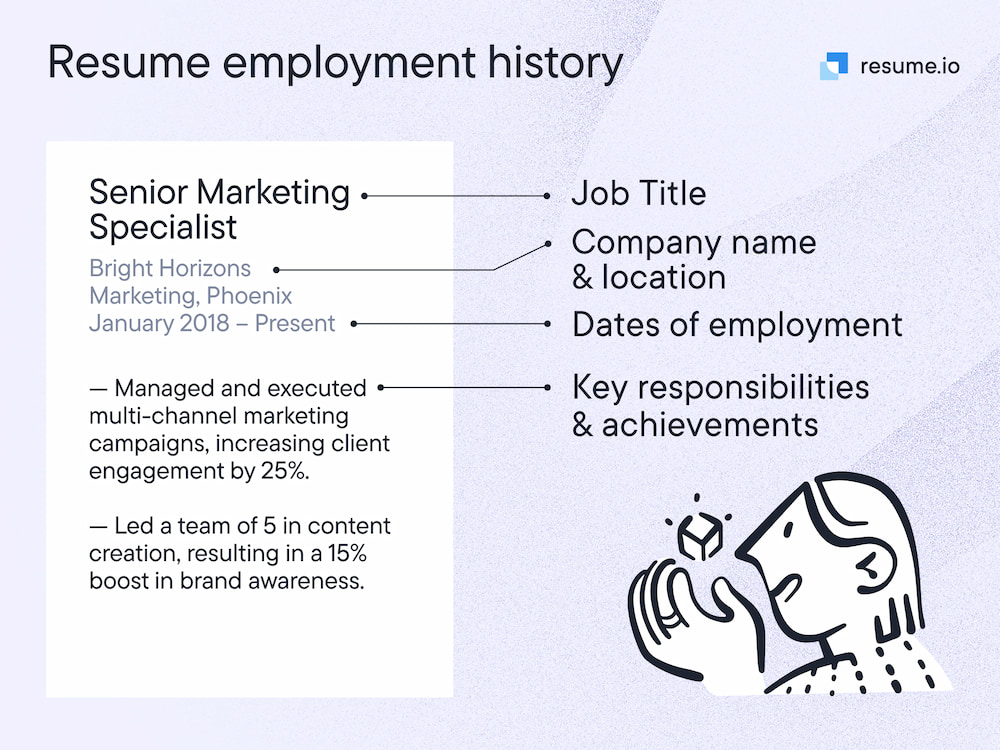
When writing a resume with no experience, your goal is to show employers your initiative and willingness to learn. Adding other types of experiences to your resume can prove you have what it takes to succeed in the new job.
Take a look at the example resume experience section below:
Resume experience section with volunteer work and extracurriculars
Volunteer Tutor, June 2024 – Present
Big Brothers Big Sisters, Austin, TX
- Provide individual tutoring in math and reading for middle school students to improve their understanding and comprehension
- Develop personalized tutoring plans for five students and encourage helpful study habits
- Communicate with parents and students to provide feedback, answer questions, and address concerns
Treasurer, September 2023–May 2024
High School Student Council, Austin, TX
- Managed a student council budget of $2,500 per semester to make sure funds were allocated responsibly
- Built financial planning and organizational skills through budget tracking and event planning
5. Add a skills section
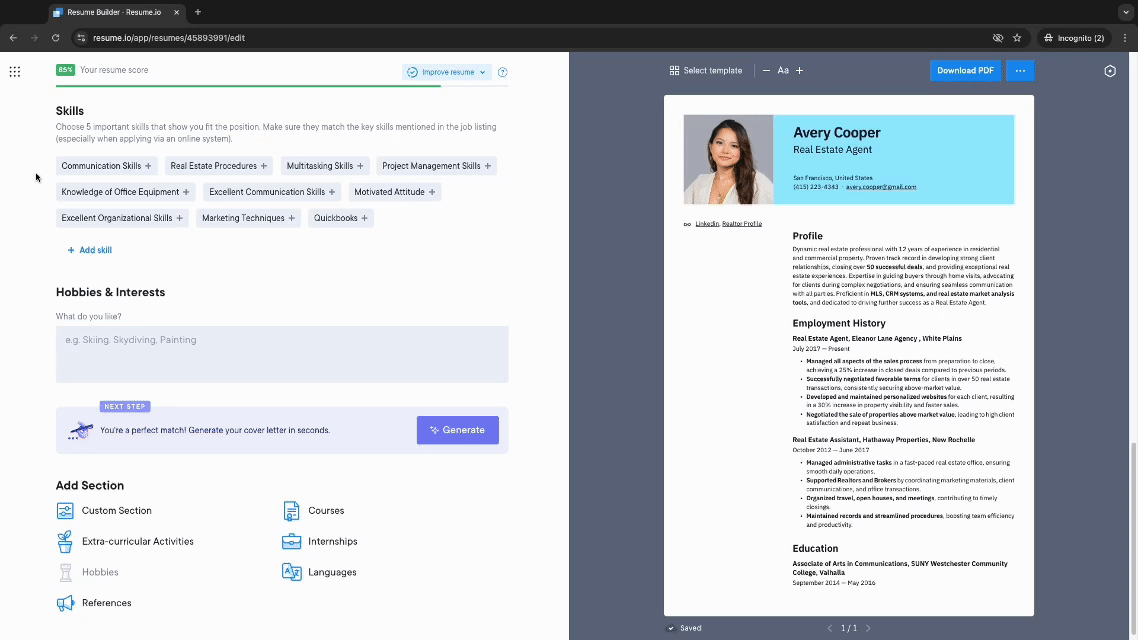
Even without experience, you have skills you can use in a new job. When listing skills on your resume, consider the job you’re targeting. What skills will you need to bring value to the role?
Check the job posting to see what skills an employer has mentioned. If you have those skills, make sure you list them on your resume.
As someone without experience, your first resume may have more soft skills or behavioral traits. You gain these skills throughout your life—not just at work.
For example, you may have learned leadership skills as the captain of your football team, or you may have sharpened your collaboration skills by working on group projects at school.
Some good soft skills to mention on a resume with no experience include:
- Communication
- Teamwork
- Problem-solving
- Adaptability
- Critical thinking
- Organization
- Creativity
- Time management
- Collaboration skills
Your resume doesn’t only need to focus on soft skills. You may have also gained hard skills through different experiences. Hard skills, also known as technical skills, are ones you learn through training or experience.
Here are some hard skills you may be able to include on your resume:
- Microsoft Office (E.g. Word, Excel, etc.)
- Google Workspace
- Social media management
- Data entry
- Basic coding skills
- Email management
- Research
- Foreign languages
Check out an example below of a resume skills section for someone with no experience:
Resume skills section with no experience
- Communication
- Microsoft Office
- Social media
- Time management
- Research and analysis
6. Consider optional sections
In some cases, you may have other experiences that showcase your value but don’t fit neatly into one of the above sections. For those experiences, you can add other sections to your resume.
For example, if you’ve taught yourself to code by completing a project, you can include it in a section called “Projects.” Provide a link to the project on Github or a personal website to show an employer your skills.
Other potential sections for a resume with no experience include:
- Writing samples or publications. If you’re applying for jobs that require writing skills, add a section to include writing samples or published work.
- Awards. Did you earn first place at the science fair, or did the animal shelter where you volunteer honor you in some way? Mention those awards to highlight your achievements.
- Hobbies and interests. A section for hobbies and interests can showcase your personality and passions.
- Languages. If you know how to speak multiple languages, include them all in a separate section.
- Certifications. List any certifications you’ve earned, such as a coding certificate or a Microsoft credential.
- Professional associations. Joining a professional organization, even on a local or student level, can show your commitment to the field.
No experience resume optimization
Entry-level roles often attract many applicants, and employers need a way to review resumes quickly. They turn to applicant tracking system (ATS) software to scan and rank resumes, so hiring managers don’t have to review each individually.
ATS software uses algorithms to process resumes based on keywords. If your resume has applicable keywords, it’s likely to rank higher with the ATS, giving your application a better chance of moving forward. On the other hand, submitting a resume with few or no keywords may get your application tossed out quickly.
Here are some tips to optimize your resume for the ATS:
- Review the job description. Many employers include keywords in their job postings. Read the job description closely to get an idea of potential keywords.
- Include keywords. Once you’ve identified some keywords, find places to use them on your resume. Add keywords in your summary or objective, experience, and skills sections. Some examples of keywords include "adaptable," "flexible," "organized," "team player," “strong work ethic," “motivated," “customer service," and "communication skills."
- Customize your resume. Don’t send the same resume for every job. Update your resume to include keywords each time you send it out to a potential employer.
For more help with mastering the ATS, check out our article on resume ATS optimization.

Writing a resume with no experience at different ages
Most people gain skills and experiences as they get older. For that reason, it can be challenging to write a resume when you’re young.
Follow these tips to write a resume with no experience during your teens and early 20s:
- Age 14. When you’re 14, use your resume to highlight volunteer work, school clubs, academic achievements, or informal jobs. For example, you can include information about your participation on the debate team, your involvement in a church group, and your babysitting gigs.
- Age 15. As you continue in high school, you may advance into leadership positions with clubs, groups, or sports teams. Include those experiences on your resume.
- Age 16. At 16, you might get your first job in an area like retail or food service. Make sure to add this work experience to your resume, as well as advanced school projects or continued leadership roles in school or extracurricular activities.
- Age 17. Closer to graduation, you can mention advanced placement classes or college preparation activities. You can also include a part-time job or an internship at a local business or government office.
- Age 18. Many people graduate high school at 18, so update your resume to reflect this achievement. You can also add your college and intended major if you’re continuing onto postsecondary education.
- Age 19. If you’re attending a college or trade school, you may be involved in academic organizations, school projects, or departmental research. You can add those to your resume, as well as study abroad trips or on-campus employment.
- Age 20. At this age, update your resume to reflect the jobs or internships you’ve held. You can also include leadership roles in student organizations or advanced coursework in areas related to your target job.
- Age 21. If you’re nearing college graduation, add school projects, such as a thesis or capstone project, to your resume. You can also include relevant certifications you’ve earned.
Common mistakes when writing a resume with no experience
It’s hard to know all the rules when writing your first resume. Here are some common first-time resume mistakes to avoid:
- Not mentioning achievements. Don’t just list what you’ve done in school, extracurriculars, or internships. Focus on your accomplishments, such as graduating with honors or being elected to the student council.
- Ignoring transferable skills. Transferable skills are the qualities you have that can be useful in any job. Highlight these skills, such as communication, organization, and time management.
- Lying. It might be tempting to exaggerate or lie on your resume to make yourself appear more experienced. If an employer catches you in a lie, though, you will almost certainly be disqualified from consideration.
- Using a complex format. Stick to a traditional, streamlined resume format without extra embellishments or flair. We offer no-experience resume templates you can use to build an optimized resume quickly.
- Forgetting to proofread. Always edit your resume carefully for grammar, spelling, and punctuation. Ask someone else to proofread your resume if you need some extra help in this area.
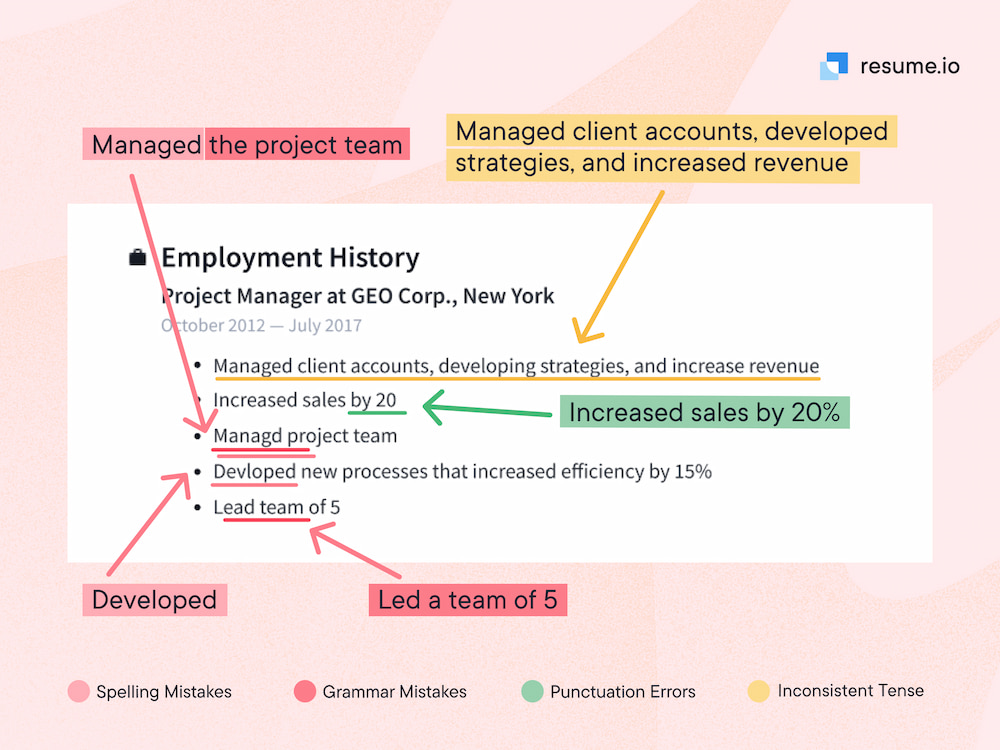
Creating a matching cover letter with no experience
Without experience, you might wonder if it’s worth writing a cover letter to go with your resume. Some employers might require a cover letter, in which case you need to provide one. Even if it’s not required, a cover letter can be a good way to convince an employer to hire you without prior experience.
When writing a cover letter with no experience, focus on your transferable skills, personality traits, and willingness to learn. Expand on the information you provide on your resume by discussing how you’ve gained your skills or used them in real-life situations. Give plenty of examples to show an employer your potential for success in a new job.
No experience resume FAQs
Have more questions about what to put on a resume with no experience? Discover the answers to these frequently asked questions:
Is it okay to have no work experience on a resume?
Yes, it’s fine to have no work experience on a resume if you’re applying for your first job or transitioning into a new field or career.
If you don’t have professional experience to include, focus on other qualifications you have, such as volunteer work, internships, and academic work.
How long should a resume be with no work experience?
Your resume should be no longer than one page.
Write concisely and use bullet points to condense information onto a single page. If you don’t have enough information to fill one page, consider other sections you can include, such as personal projects or hobbies and interests.
Do I need a resume for my first job?
Yes, most employers will require you to submit a resume for your first job, even if you don’t have prior experience.
When reviewing resumes for entry-level jobs, employers often look for other tangible ways that candidates have gained skills, contributed to projects, or collaborated with teams.
How do you write a resume without revealing your age?
Never include your age or date of birth on your resume. If you’re worried about an employer dismissing your application because you’re young, you can remove the graduation dates from your education section.
However, keep in mind that many employers hire students and recent graduates for entry-level roles, so don’t let your age keep you from applying for jobs.








